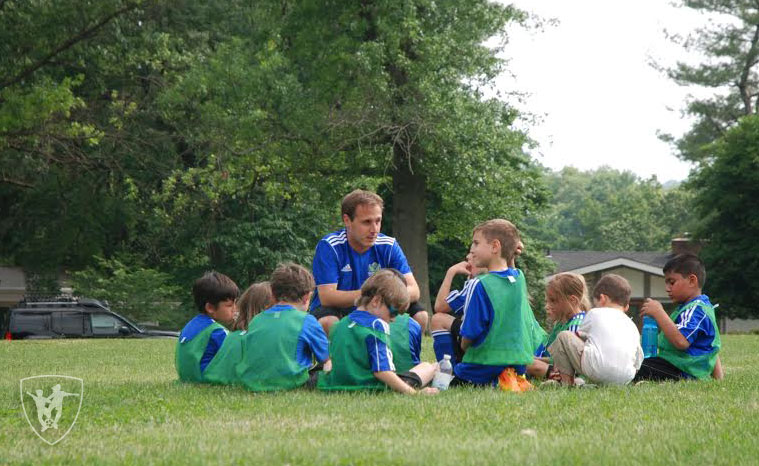Hint: It doesn’t have to be like herding cats
It is not unusual for a youth soccer coach to come prepared for a very productive practice, or with a great game plan, only to throw the entire plan away when the kids seem to do whatever they want, and not at all what the coach is asking them to do. First of all, when (not if) this happens it does not mean you are a bad coach or that you do not have control of your team. It is just natural for kids to act up a bit, especially when surrounded by their peers.
Coaching young players sure can be challenging, especially in recreational leagues where players join more for the social aspect of the game than the game itself. Here we offer 5 concrete tips that have helped us prevent, or at least minimize, players losing attention.
1 – Get on their level
When giving directions to the kids, you should physically be at eye-level with them, which means you either kneel or sit down with all of them. They know that you are an authority, and if they do act up it is not because they are challenging your authority, so there is no need to be imposing. Getting on their level, physically, sends a message to them that what you are asking them to do is attainable and you are doing it to help them.
2 – Face players away from distractions
It is challenging enough to gather your team and make them all be quiet long enough for you to provide the necessary directions. The best thing you can do is get your players into the least distracting corner of the field and have them all face you, rather than form a circle around you. I would always identify where this corner of the field is, then I’d walk over there and use a whistle to get the players to me. If they are running too wild for a whistle to work, I’d pretend to play tag where all of them are chasing me. I’d run around for a little bit, and then let them catch up and tag me when I reached my corner.
Once they are all in front of you, turn the players away from the distractions. Make sure there are no games/practices going on behind you, because the players will not hear a word you say if there are other kids running around behind you. If possible, turn the players away from the sunlight, so that their tiny bits of concentration are not impacted by non-soccer factors. Also, it might help to turn the players away from facing their parents, because they will be seeking attention from them. You can keep them close to the parents if you choose to, so that the parents can have an idea what it is the coach is saying, but have the players’ backs to them.
3 – Provide simple, to the point, directions
Players of any age and any level – from 4-year-old recreational players to the Messis and Ronaldos of the world – respond better to coaches who can get to the point quickly. Using direct language can seem stern, but in reality it is just simpler to understand. Remember, drills are all about repetition, and the more the player can repeat what is supposed to be done in his or her head the easier it will be to accomplish those repetitions. “Use the inside of your foot” will translate in their minds a lot better than “Don’t use the outside of your foot because the inside offers better control.”
4 – Do not ask questions
A lot of coaches, ourselves included, are tempted to ask a player during the game, “Where should you be?” We think of the benefit of the player thinking for himself or herself. However, the player either knows the answer and is not remembering to execute or the player did not know the answer in the first place. Both of these reasons really negate the need to be asking the player the question. Rather, tell the player where to go – again simply and directly – and if there is still confusion take the time to explain the positioning again.
5 – Stay positive and enthusiastic
This is the most important thing a coach can do, because young players only respond to positive feedback. Negative feedback tends to shut down a young player, and a shutdown is not really a response. Remember that as coaches of young players, your primary responsibility is to develop the love for the game. The more enthusiastic you are in your positive feedback, the more they will respond and learn to love the game. And as far as the skills go, a little bit of confidence goes a long way in making players give it all that they have now and want to improve for the future.

